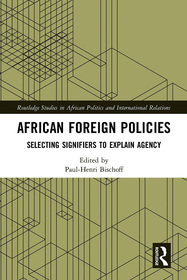
African Foreign Policies
Selecting Signifiers to Explain Agency
Sorozatcím: Routledge Studies in African Politics and International Relations;
-
20% KEDVEZMÉNY?
- A kedvezmény csak az 'Értesítés a kedvenc témákról' hírlevelünk címzettjeinek rendeléseire érvényes.
- Kiadói listaár GBP 41.99
-
20 060 Ft (19 105 Ft + 5% áfa)
Az ár azért becsült, mert a rendelés pillanatában nem lehet pontosan tudni, hogy a beérkezéskor milyen lesz a forint árfolyama az adott termék eredeti devizájához képest. Ha a forint romlana, kissé többet, ha javulna, kissé kevesebbet kell majd fizetnie.
- Kedvezmény(ek) 20% (cc. 4 012 Ft off)
- Kedvezményes ár 16 048 Ft (15 284 Ft + 5% áfa)
Iratkozzon fel most és részesüljön kedvezőbb árainkból!
Feliratkozom
20 060 Ft

Beszerezhetőség
Becsült beszerzési idő: A Prosperónál jelenleg nincsen raktáron, de a kiadónál igen. Beszerzés kb. 3-5 hét..
A Prosperónál jelenleg nincsen raktáron.
Why don't you give exact delivery time?
A beszerzés időigényét az eddigi tapasztalatokra alapozva adjuk meg. Azért becsült, mert a terméket külföldről hozzuk be, így a kiadó kiszolgálásának pillanatnyi gyorsaságától is függ. A megadottnál gyorsabb és lassabb szállítás is elképzelhető, de mindent megteszünk, hogy Ön a lehető leghamarabb jusson hozzá a termékhez.
A termék adatai:
- Kiadás sorszáma 1
- Kiadó Routledge
- Megjelenés dátuma 2022. augusztus 29.
- ISBN 9781032400266
- Kötéstípus Puhakötés
- Terjedelem288 oldal
- Méret 234x156 mm
- Súly 640 g
- Nyelv angol
- Illusztrációk 3 Illustrations, black & white 291
Kategóriák
Rövid leírás:
This book explores, at a time when several powers have become serious players on the continent, aspects of African agency, past and present, by African writers on foreign policy, representative of geography, language and state size.
TöbbHosszú leírás:
This book explores, at a time when several powers have become serious players on the continent, aspects of African agency, past and present, by African writers on foreign policy, representative of geography, language and state size.
In the past, African foreign policy has largely been considered within the context of reactions to the international or global “external factor”. This groundbreaking book, however, looks at how foreign policy has been crafted and used in response not just to external, but also, mainly, domestic imperatives or (theoretical) signifiers. As such, it narrates individual and changing foreign policy orientations over time—and as far back as independence—with mainly African-based scholars who present their own constructs of what is a useful theoretical narrative regarding foreign policy on the continent—how theory is adapted to local circumstance or substituted for continentally based ontologies. The book therefore contends that the African experience carries valuable import for expanding general understandings of foreign policy in general.
This book will be of key interest to scholars and students of Foreign Policy Analysis, Foreign Policy Studies, African International Relations/Politics/Studies, Diplomacy and more broadly to International Relations.
TöbbTartalomjegyzék:
1. Introduction 2. What Next? Past and present African foreign policy concepts and practices 3. The African Union as a Foreign Policy Player: African Agency in International Cooperation 4. Unprincipled Pragmatism and Anti-Imperialist Impulses in an Interconnected World: The Zuma Presidency, 2009-2017 5. Towards A Strategic Culture Approach to Understanding and Conceptualising Ethiopia’s Foreign Policy Towards Israel and the Middle Eastern Arab Countries 6. Nigeria’s Foreign Policy and Intervention Behaviour in Africa: What Role for Agency? 7. Zimbabwe and New Signifiers: Towards a cultural political economy of Foreign Policy Making 8. Realist Conceptions of Kenya’s Foreign Policy and Foreign Policy Behaviour: A Theoretical and Contextual Disposition 9. Addressing the Conceptual Void of African Small State Foreign Policy in Orthodox Theory: A Case Study of Botswana's Principled Pragmatism 10. Tunisia’s Foreign Policy Towards France Before and After an Undemanding ‘Revolution’: A Theoretical Explanation of the An-Nahdha-led Interim Governments’ Soft Policy 11. Straddling Between Convergence and Divergence: A Constructivist’s View of Malawi’s Foreign Policy in Post-independence Africa 12. Strategies of a Small State Between Realism and Liberalism: Sixty Years of Guinea’s Diplomacy and Foreign Policy (1958-2018) 13. Rethinking SADC’s Collective Policymaking Processes on External Relations and Non-state Participation for Region-building 14. Towards an Understanding of the Interplay Between Ghana’s Foreign and Defence Policies 15. Conclusion
Több



